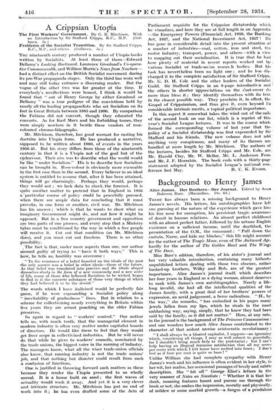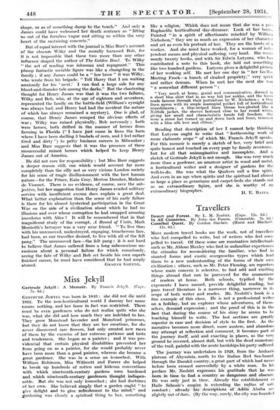Background to Henry James
THERE has always been a missing background to Henry James's novels. His letters, his autobiographies have left one guessing at the nature of the experience which gave him his fine nose for corruption, his persistent tragic awareness of deceit in human relations. An almost perfect childhood with an almost perfect father, followed by his urbane English existence on a sufficient income, until the deathbed, the presentation of the 0.111., the command : " Pull down the curtain, Nurse, and hide my blushes," this life might account for the author of The Tragic Muse, even of The Awkward Age. hardly for the author of The Golden Bowl and The Wings of The Dove.
Miss Burr's edition, therefore, of his sister's journal and her very valuable introduction, containing many hitherto unpublished letters dealing with those two obscure, rather hushed-up brothers, Wilky and Bob, are of the greatest importance. Alice James's journal itself, which describes her four years in England as a dying woman, almost deserves to rank with James's own autobiographies. Nearly a life-. long invalid, she had all the intellectual qualities of the James family, with a great deal of her brothers' powers of expression, an acrid judgement, a fierce radicalism. " H., by the way," she remarks, " has embodied in his pages many- jewels fallen from my lips, which he steals in the most unblushing way, saying, simply, that he knew they had been said by the family, so it did not matter." Here, at any rate, in the journal is the background of The Princess Casamassinus : and one wonders how much Alice James contributed to the character. of that ardent unwise aristocratic revolutionary ;
" I shall always be a bloated capitalist, I suppose—an ignominy which, considering all things, I may as well submit to gracefully: for I shouldn't bring much holy to the proletariat ; but I can't help having an illogical feminine satisfaction that all my seven per cents with which I left home have melted into fours ; I don't feel as if four per cent is quite so base ! "
Unlike William she had complete sympathy with Henry James's work and his influence is often evident in her style, in her wit, her malice, her occasional passages of lovely and subtle description. She " hit off" George- -Eliot's letters in the very manner of Notes on Novelists : " Whether it is that her dank, moaning features haunt and pursue me through the book or'not, she makes the impression, morally and physically, of mildew or some morbid growth—a fungus of a pendulous shape, or as of something damp to the touch." And only a James could have welcomed lies deathSentence as " lifting us out of the formless vague and sitting us within the very heart of the sustaining concrete."
But of equal interest with thejournal is Miss Burr's account of the obscure Wilky and the morally harassed Bob, for
it is not impossible that these two more than any other influence shaped the author of The Golden Bowl. To Wilky " the act of reading was inhuman and repugnant." This plump fantastic sociable figure was like a changeling in the family ; if any James could be a " low brow " it was Wilky, who wrote from his brigade, " Tell Harry that I am waiting anxiously for his ' next.' I can - find a large sale for any blood-and-thunder tale among the darks." But the chastening thought for Henry James was that it was the two failures, Wilky and Bob, who, at the age of eighteen and seventeen, -represented the family on the battle-field (William's eyesight was always bad, and Henry had had the accident the mature of which has always remained a mystery). One is glad, of course, that Henry James escaped the obvious effects of war ; Wilky was ruined physically, Bob nervously ; both 'were heroes, both drifted in the manner of heroes from farming in -Florida (" I have just come in from the barn where I have been shelling 5 bushels of corn, and I feel rather tired and dirty ") to petty business careers in Milwaukee ; and Miss Burr suggests that it was the presence of these unsuccessful ruined heroes which helped to keep Henry James out of America.
He did not care for responsibility ; but Miss Burr suggests
deeper reason still, one which would account far more completely than the silly not so very vicious London society .for his sense of tragic disillusionment with the best human pature—for the Prince, Kate Croy, Merton Densher, Madame 4e Vionnet. There is no evidence, of course, save the sub- jective, but her suggestion that Henry James evaded military service with insufficient excuse does explain a great deal. What better explanation than the sense of his early failure Is there for his almost hysterical participation in the Great War on the side of a civilization about which he had no illusions and over whose corruption he had swapped amusing anecdotes with Alice ? It will be remembered that in that Magnificent study of the corrupt, A Round of Visits, Mark pdonteith's betrayer was a very near friend. " To live thus With his unremoved, undestroyed, engaging, treacherous face, had been, as our traveller desired, to live with all of the felt pang." The unremoved face—the felt pang : it is not hard to believe that James suffered from a long subconscious un- easiness about a personal failure for which consciously, seeing the fate of Wilky and Bob set beside his own superb finished career, he must have considered that he had amply



















































 Previous page
Previous page